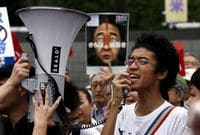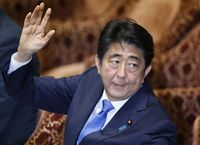By Linda Sieg
TOKYO (Reuters) - Crowds of protesters rallied on Wednesday as Japan's parliament moved close to passing bills for a defence policy change that could allow troops to fight abroad for the first time since World War Two, despite opposition by many ordinary voters.
Thousands of demonstrators gathered in the rain, chanting "Scrap the war bills now" near parliament, where Prime Minister Shinzo Abe was to join final debate on an upper house panel.
Protesters jostled with police, who blocked them from swarming into the street with lines of vans. The government aims to have the full upper house enact the bills this week.
It was the latest in a string of protests that have echoed those that forced Abe's grandfather, Nobusuke Kishi, to resign as premier after ramming a U.S.-Japan pact through parliament 55 years ago.
The government says the changes to the law, welcomed by the United States, are vital to meet new challenges, such as those presented by rising neighbour China.
Opponents say the revisions violate the post-war pacifist constitution and could embroil Japan in U.S.-led conflicts.
"For those who understand the principles of the constitution ... the only choice is to oppose these bills," Aki Okuda, 23, a founder of activist group Students Emergency Action for Liberal Democracy, told a news conference.
Abe's ruling bloc has an upper house majority, but major opposition parties have vowed to prevent a vote before parliament disperses on Sept. 27 with delaying tactics such as no-confidence motions.
The bills have been approved by the lower house.
The revisions include an end to a decades-old ban on defending a friendly nation under attack, or collective self-defence, when Japan faces a "threat to its survival".
The measures expand the scope for logistics support for the militaries of the United States and other countries, and for participation in peacekeeping.
Some Southeast Asian countries, worried by China's actions to bolster its claims in the disputed South China Sea, have welcomed Japan's shift.
China, where there is deep anger over Japan's brutal occupation before and during World War Two, has said the legislation would "complicate" regional security.
The revisions will still leave Japan constrained in overseas military operations by legal limits and a deeply rooted public anti-war mindset.
"If you look at before this set of legislation and related changes, it was a pretty ludicrous situation where Japanese Self-Defence Forces could barely do anything worthy of the name of defence forces except in a major attack on Japan," said Alan Dupont, a professor at the University of New South Wales.
"I'd say they've moved from 25 percent to 50 percent. It's like a doubling of their flexibility and capacity to deploy forces overseas, but we're still 50 percent short of what the industry standard is."
(Additional reporting by Shiori Ito; Editing by Robert Birsel)



